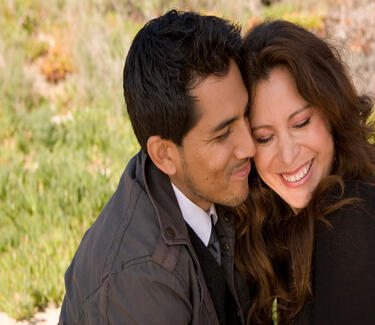 Is marriage counseling or relationship therapy right for me?
Is marriage counseling or relationship therapy right for me?
There are many reasons why people seek counseling services. Many couples seek marriage counseling in response to an affair, or suspicion of an affair. Other common issues which prompt couples to seek help include: conflict over financial issues, parenting differences, problems with in-laws or step children, increased emotional distance, a decrease in intimacy or sexual satisfaction, poor communication, and escalating conflict.
The decision to seek professional help is an essential first step to help a person find solutions to personal problems or relationship concerns. Sometimes it is to deal with long-standing relationship issues and associated symptoms of anxiety or depression. Other times it is to come to terms with unexpected changes in one's life or growing dissatisfaction with one's marriage. Other issues which prompt a couple to seek counseling include health problems, adjustment to retirement, substance abuse, and career changes. We can help provide support, greater clarity, and new strategies for improving the quality of a significant relationship.
Do we really need marriage counseling or couples therapy? We can usually handle problems on our own.
Every marriage goes through challenging situations and most of life's "day-to day" problems can usually be managed through a couple's own efforts and resources. However, when an individual or couple encounter a problem of notable magnitude, or a problem which lingers or periodically reoccurs, it is appropriate to seek professional help early, rather than later. Counseling can provide long-lasting benefits and support, giving you additional skills to avoid triggers, re-direct damaging relationship patterns, and overcome whatever challenges you and your partner face.
I have my own issues (as does my spouse.) Shouldn't we seek individual counseling to address individual issues before we engage in relationship or marriage counseling?
Everyone brings individual issues into their relationship. As such, it not possible to separate "individual" from "relationship" problems in any meaningful way. While individual counseling sessions can be useful, if "individual" issues cause problems (directly or indirectly) in one's relationship or marriage - clinical outcome research clearly indicates that participation of one's partner is essential.
According to research findings, when the primary goal is to improve the marriage or relationship, a person who engages solely in individual therapy typically feels better about themselves - but often less positive about their relationship or marriage. As such, consultation and possible participation of one's partner is essential to avoid an unintended increase in relationship dissatisfaction and conflict. Your individual needs and the unique needs of your relationship will be addressed during the initial consultation sessions and an appropriate course of therapy will be discussed. This may include couples therapy exclusively - or individual therapy in combination with couples therapy.
I am not sure I want to remain in my marriage - is counseling an option?
All marriages encounter stressful times and many couples are unable to resolve problem issues through their own efforts. As such it is not uncommon to consider separation or divorce in response to on-going martial conflict or a chronically unhappy relationship. However, with professional help, couples in crisis are often able to make a new commitment to their relationship and build a more satisfying marriage. Working with an experienced marriage counselor, a couple can gain a better understanding of issues and develop new approaches for bringing about needed changes. For many couples, the experience of marriage counseling results in increased intimacy and an emotionally healthier relationship.
The role of the therapist is to clarify issues so that each partner is better able to make well-informed decisions about the future direction of their relationship. While any question about marital status belongs to the client, for couples who wish to remain married and improve the quality of their relationship, the counseling process can lead to a greater level of marital satisfaction. For individuals or couples who have decided to end their marriage, divorce-adjustment counseling or family counseling can help address relationship transition issues and work toward reducing conflict and the negative impact of separation or divorce on children.
What about the cost?
Dr. Canfield's hourly fee is $300. The hourly fee for affiliated professionals working with Dr. Canfield ranges from $120 to $300 - depending upon experience and type of service (i.e. initial consultation, one-hour therapy session, all-day marriage intensive therapy, telephone consultation, video consultation, etc.)
Counseling involves an investment of time, money, and effort. As such, you should seek professional help only if you are motivated and willing to work to bring about meaningful change. In considering the cost of therapy, it is important to not only consider the hourly fee of the therapist, but the length and estimated overall cost of treatment. Each person and each couple is unique. Some clients may only require a single consultation session. Other clients - based on need and circumstances - may require a longer period of on-going therapy sessions to realize desired changes. We will be glad to discuss your particular needs and what therapeutic format might be best suited to your needs. There is no guarantee that marriage counseling will preserve a particular marriage, since the decision to remain married or end the relationship belongs to each partner. However, in purely financial terms - the cost of marriage counseling is a fraction of the cost of divorce or on-going relationship conflict.
What is therapy like?
Every therapeutic relationship is unique and tailored to the needs and goals of each individual, couple, or family. Counseling provides a safe, professional, confidential, non-judgmental, and supportive setting in which the therapist and couple client work as a team - discussing issues of concern, identifying options, and developing and implementing a strategy or course of action for improvement. The therapy process may focus on a specific issue or address more complex issues or concerns.
You and your partner will be asked to take certain actions outside of therapy, including "home work" assignments, practicing new behaviors, or keeping records to track certain target behaviors. It is important to process what has been discussed during therapy and integrate it into your life or relationship. For the counseling process to be most effective you must be an active participant. People seeking counseling are taking responsibility to improve their situation, gaining greater awareness, and working toward relationship change. Here are some things you can expect out of counseling:
- Confidentiality - under State law, anything discussed is protected on the same basis of confidentiality as exists between an attorney and client.
- Ethical practice which always focuses on the best interest of the client.
- Compassion, acceptance, and understanding
- A non-judgmental attitude and respect of your personal values and religious and and/or philosophical beliefs
- An objective perspective to help gain better insight into persistent negative behavioral patterns, thoughts, and feelings
- Effective and proven techniques and specific suggestions for bringing about positive changes.
Is medication an alternative to therapy?
Although medication can be useful to some clients who exhibit certain physical symptoms - such as depression or anxiety - medication by itself will not change the underlying problem or resolve relationship conflict. There is no pill to produce a happy marriage. A successful relationship involves commitment and a willingness to honestly examine personal choices and preferences, shared goals, and priorities. On occasion, a combination of medication and counseling may be helpful to some individuals who are struggling with psychiatric symptoms, in addition to relationship concerns. Working in concert with your medical health care provider we can determine what is best for you. Instead of just treating symptoms, therapy addresses the "root causes" of distress and the behavioral patterns that block progress toward attaining goals and improving relationships. We believe that you can best achieve sustainable growth and a greater sense of well-being with an integrative approach to wellness.
Do you accept insurance? How does insurance work?
We are a "direct pay" practice and we do not accept insurance in lieu of full payment for services at the time of each office visit. However, please consult the section on "Fees & Insurance Policy" for specific details about our insurance policy and how you might be eligible for direct reimbursement. Insurance companies vary widely in their coverage or extent of coverage of marriage counseling and relationship issues. To determine the extent of your mental health and/or relationship counseling coverage, you should contact your insurance provider. Check your coverage carefully and find the answers to the following questions:
- What are my mental health benefits?
- Does my insurance cover marriage counseling or couples therapy?
- What is the coverage amount per therapy session?
- How many therapy sessions does my plan cover?
- How much does my insurance pay for an out-of-network provider?
- Is approval required from my primary care physician?
- Can I be reimbursed for "out-of-pocket" costs?
We accept credit cards, cash, Zelle bank transfer, and personal checks in payment for services. Upon request, we will provide you with a monthly summary statement of services, which you may submit to your insurance company for possible reimbursement directly to you.
Is therapy confidential?
Yes. State law protects the confidentiality of all communications between a client and licensed therapist on the same basis as exists between an attorney and client. No information is disclosed to a third party without the prior written permission of the client. The only exceptions to this are situations in which human life is at clear and immediate risk (such as active suicidal intentions) or in cases of suspected child or elder abuse, as mandated by law. If you have any questions concerning confidentiality, these can be discussed during the initial consultation session before any specific information is disclosed.
















